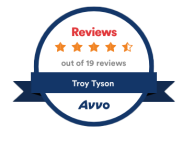Many people face financial challenges at various times in their lives. The loss of a job, a medical emergency, a failed business, or any number of other catastrophes could lead to financial hardship quickly and unexpectedly. In some situations, bankruptcy can provide a platform for someone in financial trouble to get a “fresh start.” Bankruptcy is not a magic pill, and does come with some consequences which must be weighed heavily when determining whether or not to file. However, declaring bankruptcy may allow some people to eliminate much of their debt, save income, and get a handle on their finances.
For many, the process of declaring bankruptcy seems mysterious and intimidating. How do I get started? Does it cost a lot? Do I have to appear in court? Will I even qualify? These questions are addressed in this article. While the bankruptcy process is certainly not this easy, you will find that it is not overly-complicated once you have a good understanding of everything involved.
Which chapter are we on?
If you are considering filing for bankruptcy, you will have two options: a Chapter 7, and a Chapter 13. A Chapter 7 bankruptcy allows you to eliminate much of your unsecured debt, and get a “fresh start.” This is the type of bankruptcy that comes to mind for most people when they think about personal bankruptcy. It can be accomplished in a matter of months, and in most cases will require that you give up “non-exempt” property, if you have any. In order to qualify for a Chapter 7, you’ll need to make below a certain amount of income (currently around $40,000 for a one-person household in Indiana).
A Chapter 13 bankruptcy, on the other hand, doesn’t get rid of all of your debts, but rather creates a payment plan between you and your creditors. Under this type of bankruptcy, you would work with your creditors to develop a repayment arrangement, which would include a strict budget. The process would be overseen by a court-appointed trustee, who would monitor the process and ensure adherence to the plan. A Chapter 13 plan will allow you to keep many of your assets, while also paying off much of your debt over time. If, for some reason, you find that you can’t make the monthly payments required by a Chapter 13, then the plan fails, and your debts remain, unless you are able to convert to a Chapter 7. This type of plan is typically undertaken by individuals who are having trouble paying on secured debts, such as mortgages, or sometimes, by people who attempt to do a Chapter 7 filing, but are restricted because they fail the means test (see below), and are left with few options other than going with a Chapter 13.
What do I qualify for?
If you are interested primarily in a Chapter 7 bankruptcy, you will first need to determine whether you qualify. This is done by taking the “means test” required of all potential filers under the new bankruptcy law, which took effect in October of 2005. Your results from the means test create an initial determination of which type of bankruptcy you qualify for. The test is a mathematical formula which takes into account your monthly income, the kind of debts you have and their amounts, and several other aspects of your individual situation.
In order to qualify for a Chapter 7 under the means test, you would have to have an income which is less than the state median for Indiana. If your income does not fall below the state median, then you’re not out of the game yet. At that point, you would need to compile a list of expense deductions, and see what your disposable income would be over the course of five years. The result of this extensive form will determine whether you can file for Chapter 7, or are only eligible to file a Chapter 13 bankruptcy. Although not official, you can take a sample means test here, to get a good idea of whether or not you would qualify for a Chapter 7 filing.
Once you have worked your way through the means test and determined which type of bankruptcy you’re eligible for, the actual process will look something like this:
- Attend mandatory pre-filing credit counseling
- Before an individual may make a Chapter 7 or Chapter 13 filing, he or she is required to participate in a credit counseling session and obtain a certificate of proof. The agency from which you receive counseling must be one that is approved by the U.S. Trustee in Indiana, and many of the available courses can be done either online or over the phone. Counseling costs typically range from $50-$75. This counseling must be done within the six month period before you file for bankruptcy, so if you plan to file in the near future, it is best to get going on the counseling as soon as possible. You can find some approved credit counseling providers here.
- Gather all necessary paperwork about your finances
- At this stage you will need to lay out your current income sources, detail major financial transactions from the last two years, go over monthly living expenses, and more. Expect to complete and compile between 30-50 pages of material.
- Determine your exemptions
- Once your paperwork is compiled, you will then want to see which exemptions you are eligible for. Indiana offers a set of bankruptcy exemptions which will play a role in determining what assets you get to keep under a Chapter 7 bankruptcy, and help to determine how much you will pay back unsecured creditors in a Chapter 13. Each situation is different, so you will need to figure out which exemptions may apply in your case.
- Filing your forms
- File your forms with the appropriate court. When you file, you can expect to pay between $250-$350 for court filing and administration fees. You will also want to make sure you file in the proper court. You can find out which court is your appropriate filing court here.
- Attend a “341 Meeting” with your creditors
- About a month after your filing, you will be assigned to meet with the bankruptcy court trustee. At this meeting, the trustee will likely ask you questions about the information on your forms. Creditors may also attend and ask questions, or object to some of your information or the exemptions you are attempting to claim. This is not a one-sided process, however. You will have the opportunity to respond to objections raised by the trustee or your creditors. Timing, strategy, and responses to the possible objections are best handled by a bankruptcy attorney.
- Attend mandatory debtor education
- More classes and counseling? Yes. Before your discharge is granted, you will be required to complete what are called Debtor Education classes. This will basically be a course in debt management, designed to help people who have fallen on hard times improve their financial and debt planning skills. Expect to spend about the same as you would on the credit counseling course, in the range of $50-$75. You can find eligible course offerings here.
- Receive your official discharge
- Assuming all goes smoothly, you can expect to receive a discharge of your eligible debts within 3-5 months after filing.
How much is this going to cost?
The potential cost of a bankruptcy filing will vary depending on which chapter you file under, whether you use an attorney or do it yourself, and the attorney you choose to go with. For Chapter 7 bankruptcies, if your situation is relatively straightforward and you do the filing yourself (otherwise known as filing “pro se”), you would only be responsible for the counseling courses (about $150 for both), and the filing fees (about $350). So, you would be looking at a total cost of about $500. If you went with an attorney for a straightforward Chapter 7 (which is recommended in most cases), you would be responsible for the same educational and filing fees, plus whatever the attorney charged. While some attorneys do hourly work in this field of law, most bankruptcy attorneys work on a flat-fee basis. The typical attorney fee range for a simple Chapter 7 filing is between $700 and $1,800. So, adding in your court costs and educational fees, you can expect to pay between $1,200 and $2,300 total for a simple Chapter 7 done with an attorney.
More complicated Chapter 7 filings, as well as most Chapter 13 filings, are more involved, and almost always require an attorney. Because of their high level of complexity, the amount of work involved, and the amount of time they require, these types of bankruptcy filings will cost significantly more than the basic Chapter 7 type. You should expect to pay between $2,500 and $4,000 for one of these filings.
Additionally, if you are a low-income or indigent client, you still have options. There are certain filing fees which may be waived by the court you are filing with, upon a showing of economic hardship. Check with your local court to get more information on this process. Also, if you need an attorney but feel like you can’t afford one, the Indianapolis Bar and other state organizations can connect you with low-cost or pro bono legal services, so you can get the representation you need. You can learn more and connect with a local agency by using the Indiana Pro Bono and Legal Aid Search Tool.
The personal bankruptcy process can seem overwhelming and intimidating, but it doesn’t have to be. Use your online resources, do your homework, and, if at all possible, get with a competent attorney, and you can use this process to improve your financial situation. There are a number of resources listed below to get you started. If you have any questions, or would like more information, please contact us at any time.
Resources
- Indianabankruptcy.com: A great website with lots of BK information
- Sample Means Test: Get a sense of whether you would qualify for a Chapter 7
- U.S. Bankruptcy Court, Northern District of Indiana
- U.S. Bankruptcy Court, Northern District Pro Se Information Center
- U.S. Bankruptcy Court, Southern District of Indiana
- U.S. Bankruptcy Court, Southern District Pro Se Information Center
- List of approved Credit Counseling agencies
- List of approved Debtor Education agencies
- List of Exemptions allowed under Indiana law
- Indiana Pro Bono and Legal Aid Search Tool
NOTE
This article primarily references Indiana law. Please check the laws of your local jurisdiction if you live in another state.
The articles in this blog are for informational purposes only. No attorney-client relationship is established through the publication of these articles.







